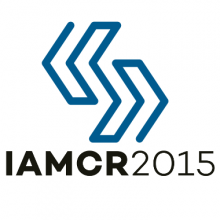
The Journalism Research & Education Section invites submissions for its open sessions at the IAMCR conference will take place in Montreal, Canada from 12th to 16th July 2015.
Conference theme: “Hegemony or Resistance? The Ambiguous Power of Communication”
See the conference key dates and deadlines: http://iamcr.org/congress/montreal2015-keydates
See all Calls for Papers for IAMCR 2015: http://iamcr.org/congress/montreal2015-cfp
Visit the conference website: http://congresiamcr.uqam.ca
The way in which media and power are intermingled today makes it difficult to differentiate their roles. Government sometimes abuses its power and protects itself by targeted and manipulated news releases that are programmed to get its message across and to justify its actions. While reporters are faced with fierce competition of new media and often without the time and resources are obliged to make thorough investigations.
This dilemma does not allow them to verify their sources and to assume that news provided by seats of power is true. And this leads to a vicious circle in which, when news is discovered to be false, power and the media mutually deny responsibility for the error so that both lose credibility.
The profession of journalism often struggles around competing hegemonic and counter-hegemonic voices and actors in an attempt of attaining the democracy projects. The field of journalism education has aimed to shape or emerge as a space to address the practices and standards changing with the political-economic landscape of neoliberal globalization. This dialectical relation jeopardises the journalism as a profession between two polarized views of either as purveyors of ruling perspectives or as anti-systemic popular forums and activist groups.
Corporate interests have colonised the field of journalism and its education, its dominant institutions as well as its professional assumptions, practices and routines. Such perplexity is especially problematic for working journalists. That is, while economic imperatives and commercial interests have long constrained journalistic autonomy, the corporate consolidation of the news industry – with the attendant demands for cost cutting on one hand and profit maximisation on the other – has all but extinguished any semblance of a free press.
This year, the Journalism Research and Education (JRE) section, aims to address a number of key questions here: How do journalism come about this ambiguity, power and resistance to face the evolving hegemony? How has journalism changed? What, on the one hand, should be done to return the media to its origins as a watchdog of power and, on the other, force the system to accept the media as one of the essential controls that guarantee democracy?
The Journalism Research & Education Section is opened for panel proposals, workshop sessions and research papers proposals to address the issues related to exploring the dynamics of media systems, communication patterns and organizational relationships within this new "framing" of region as a physical and conceptual category.
The JRE section considers this general idea through the lens of the five JRE themes:
- International Collaborative Research in Journalism Research: New Challenges and Emergent Perspectives
- Innovations in Journalism
- The Professional Journalism
- Methods for Quantifying Professional Journalism
- Generic Studies of Journalism
Abstracts should range between 300 and 500 words in length including the research objectives, theoretical framework and methodology. Each proposal must include title, name(s), affiliation, institutional address and email addresses of the author(s). All abstract submissions must be made centrally via the IAMCR Open Conference System (OCS) available for abstract submission at http://iamcr-ocs.org.
This section accepts abstracts in English, French or Spanish, and will arrange for presentations in the three languages as well.
It is expected that for the most part, only one (1) abstract will be accepted per person in the research paper proposals in the JRE section Program. But the author could also submit a panel proposal.
Please note also that the same abstract or another version with minor variations in title or content must not be submitted to other Sections or Working Groups of the Association for consideration, after an initial submission. Such submissions will be deemed to be in breach of the conference guidelines and will be automatically rejected by the Open Conference System, by the relevant Head or by the Conference Programme Reviewer. Such applicants risk being removed entirely from the conference programme.
The JRE section encourages its members to take part in their moderation and chairing sessions so please let us know, if you are interested (jre09is[at]gmail.com)
Paper Submission
Early submission is strongly encouraged. Individuals may submit 1 abstract (paper) per Section or Working Group as lead author, and a maximum of 2 abstracts (papers) to a single IAMCR conference in general.
Panel/Workshop Submissions
Panels/Workshops are for 90 minutes. A complete panel proposal will include:
- The panel/workshop description, including, the panel title, a framing text, the names of the panellists and the titles of their papers. The framing text (maximum 350 words) should contain the overall idea and goal of the panel. A panel chair/workshop moderator and a discussant should also be proposed.
- An abstract for each paper, including title and author(s). Abstract submissions must include the words PANEL/WORKSHOP PRESENTATION in their title and the complete title of the panel in the first line of the abstract.
IAMCR accepts presentations in English, French and Spanish. However, it is requested that abstracts, if at all possible, be submitted in English.
Journalism Research and Education Section
Chair:
Ibrahim Saleh
jre09is [at] gmail.com
JRE Blog: jre09.blogspot.com
JRE Website: http://jre.uct.ac.za/index.php
JRE Facebook: http://www.facebook.com/?ref=hp#!/pages/JRE/174511695948542
Twitter: DrIbrahimSaleh
Skype: IbrhaimSaleh112
Vice-Chairs:
Cláudia Lago
claudia.lago07[at]gmail.com
Kerry Green
kerry.green[at]unisa.edu.au
See the conference key dates and deadlines: http://iamcr.org/congress/montreal2015-keydates
See all Calls for Papers for IAMCR 2015: http://iamcr.org/congress/montreal2015-cfp
Visit the conference website: http://congresiamcr.uqam.ca